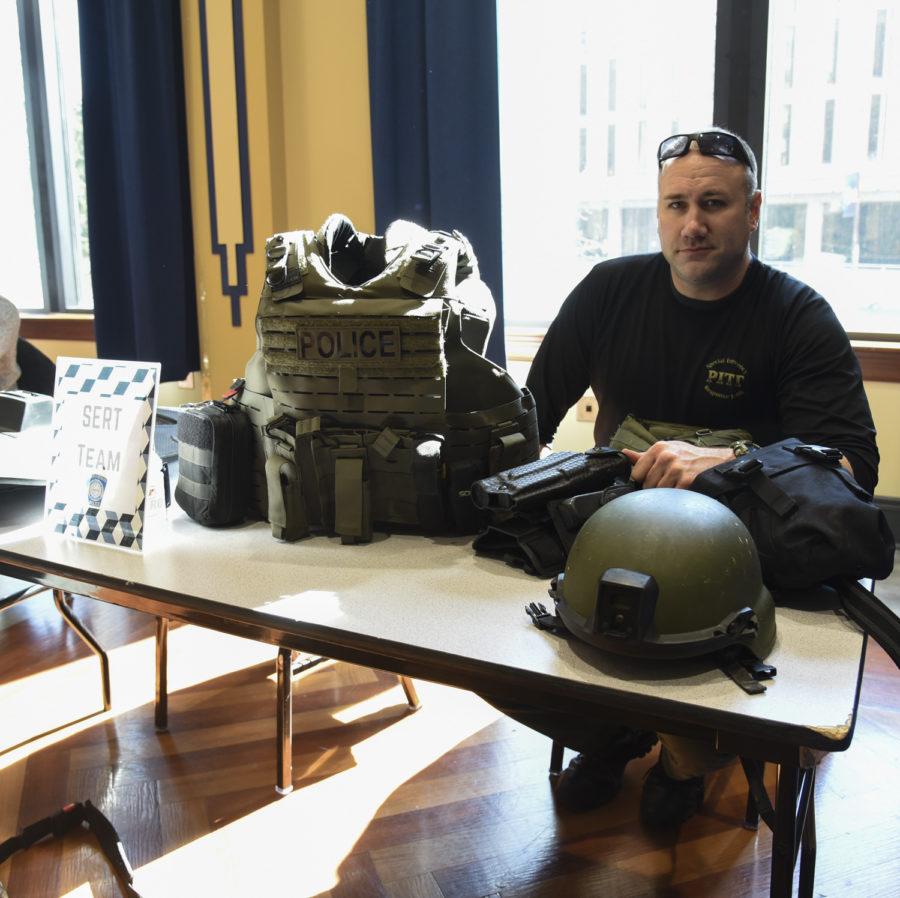Pitt Police offer resources at biannual Safety Fair
Knox Coulter | Staff Photographer
Mike Matta, a detective at the Pitt Police and a member of the Special Emergency Response Team, sits at a table informing visitors about the SERT team.
February 28, 2019
Though fewer than 15 students showed up to the Safety Fair in the first hour of the event, those who attended learned valuable information about how to stay safe.
Students walked from table to table at this semester’s biannual Safety Fair, which lasted from 11 a.m. to 1 p.m. on Wednesday in the William Pitt Union’s Assembly Room. The event was hosted by SGB and gave OCC credit to students who attended.
Some tables offered general safety advice applicable to students. Pitt Information Technology hosted a table and provided tips to avoid phishing scams and other online dangers, and Panther Central distributed information about keeping areas of residence safe, particularly when it comes to cooking.
External organizations gave relevant advice as well. Shannon Hefferan, a meteorologist with the National Weather Service, tabled at the event to teach students more about emergency preparedness in case of weather events. She said students should know what the daily weather will be before leaving their residences.
“Just be aware of what the weather’s going to do that day,” Hefferan said. “If you’re going to do traveling across the state or to campus or to anywhere, we just want you to be aware of the impacts of that type of weather.”
Chris Casamento, the director of emergency management at Pitt, said students can become aware of the weather through Pitt’s StormReady program, which communicates emergency weather situations to students
“We’re constantly monitoring what [the NWS] is pushing out, and then we push it out on our social media channels, we push it out on our emergency management website,” Casamento said.
Hefferan said students should also be prepared for more extreme weather events as the climate changes. In particular, she said, Pittsburgh is prone to more extreme flooding, something students should anticipate.
“Places that haven’t flooded before are starting to flood, so be aware of where your floodplain is, be aware of creeks and streams and areas that are vulnerable now,” Hefferan said. “They weren’t in the past, but now they are.”
By far the largest presence at the event was the Pitt Police, which hosted more than five tables to communicate various ways they work to keep students safe. The Pitt Police were there primarily to let students know about resources available to them to stay safer.
Jess Scott, a junior resident assistant studying political science and economics, attended the event to learn more about resources that could be passed along to first-year students. Scott said the Rave Guardian application, a smartphone app that gives students rapid contact with local police, was innovative.
“It was something that I wasn’t really familiar with, and I think it’s a really cool resource that I’m definitely going to share with my residents,” Scott said.
Heather Camp, an officer with the Pitt Police, organizes the Self-defense Awareness Familiarization Exchange. She said the class provides valuable information to students who may know nothing about self-defense.
“We talk a lot about situational awareness, and not just specific to the Oakland area, but anywhere that they live, anywhere that they go socialize,” Camp said.
Mike Matta, a detective for the Pitt Police and a member of the Special Emergency Response Team, had police equipment like gas masks, Kevlar vests and ballistic shields on his table. The SERT team is similar to a SWAT team, he said, and hasn’t been deployed since the 2012 shooting at Western Psych, across the street from UPMC Presbyterian.
Matta said he wanted students to be aware that there would be police response to major threats on campus.
“[We’re trying to] let everyone know that our team exists,” Matta said.
Other officers noted the ways the Pitt Police is trying to gain students’ trust. Pitt Police Lt. Bradley Kiefer discussed how students are protected under amnesty laws in cases of medical emergency relating to alcohol and emphasized that students should contact police or medical professionals if their friends are too intoxicated.
“I want people to realize that the police, first and foremost, we want to help people,” Kiefer said.
Mario Devine, an officer in the Pitt Police community relations unit, said he and other members of his unit focus specifically on building trust by visiting the Oakland neighborhood frequently.
“[We try] to reach out to the community, try to make more of a connection with the community, as opposed to what people see police officers doing their jobs,” Devine said.
He said the community relations unit has hosted “Coffee with a Cop” multiple times, an event where police officers sit in coffee shops and wait for residents to go talk to them. Residents can talk to the police about any topic, even if it’s not relevant to police matters.
“We’re showing that we’re here, and we’re involved,” Devine said.








